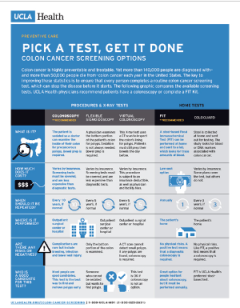Colorectal Cancer Screening
Screening Options

There are several colorectal cancer screening options to choose from. Each screening test has different features. Below are screening tests that are available to UCLA Health patients: Colonoscopy, fecal immunochemical test (FIT), stool DNA test, CT colonoscopy (virtual colonoscopy), and flexible sigmoidoscopy.
Download screening options list
Tests that visualize your colon
Colonoscopy
Performed every 10 years
- Uses a colonoscope (“scope”) with a light and camera to examine the inside lining of the colon while the patient is sedated
- Considered the gold standard for finding colon cancer or precancerous polyps
- Can prevent colorectal cancer
- Can detect very early colorectal cancers
- Requires patients to take a “bowel prep” or bowel cleanse to empty the colon the day before the procedure
- Procedure is performed in a hospital or medical clinic
- Requires sedation (anesthesia) to put the patient to sleep
- Risks include bleeding, infection, and perforation but these are considered minimal with a reported complication rate of less than 1:1000 at UCLA Health.
- If normal, must be repeated in 10 years
CT colonoscopy (virtual colonoscopy)
Performed every 5 years
- Uses a CT scan (CAT scan) to inspect the lining of the colon for polyps
- Requires patients to take a “bowel prep” or bowel cleanse to empty the colon the day before the procedure
- Procedure is performed in a hospital or medical clinic
- Not able to detect very small polyps
- If the test detects polyps or cannot differentiate between what may be a polyp, a colonoscopy must be performed to further investigate and remove the polyps
Flexible Sigmoidoscopy
Performed every 5 years
- Uses a colonoscope (“scope”) with a light and camera to examine the inside lining the colon while the patient is sedated
- Examines only the bottom portion of the colon
- Can prevent colorectal cancer
- Can detect very early colorectal cancers
- Requires patients to take a “bowel prep” or bowel cleanse to empty the colon the day before the procedure
- Can be done in clinic
- Does not require sedation or anesthesia
- If polyps are found, a colonoscopy must be performed
Tests that check your stool
Fecal immunochemical test (FIT)
Performed once a year
- Tests the stool for small amounts of human blood that cannot be seen with the naked eye
- Patient can perform the test at home
- Patient uses materials provided to collect a small stool sample
- Kit with small stool sample is mailed to the laboratory at UCLA for processing
- If the result is abnormal (positive for blood), a colonoscopy must be performed to find the source of blood loss
- Very low-risk screening option
- Must be performed each and every year to be most effective
Fecal immunochemical & DNA Test (Cologuard)
Performed every 3 years
- Includes a test for DNA markers associated with colorectal cancer and for small amounts of human blood that cannot be seen with the naked eye
- Test kit is sent to the patient’s home
- Patient uses materials provided to collect a small stool sample
- Test kit with small stool sample is mailed to the laboratory for processing
- Needs to be performed every three years to be most effective
- If the result is abnormal, a colonoscopy must be performed